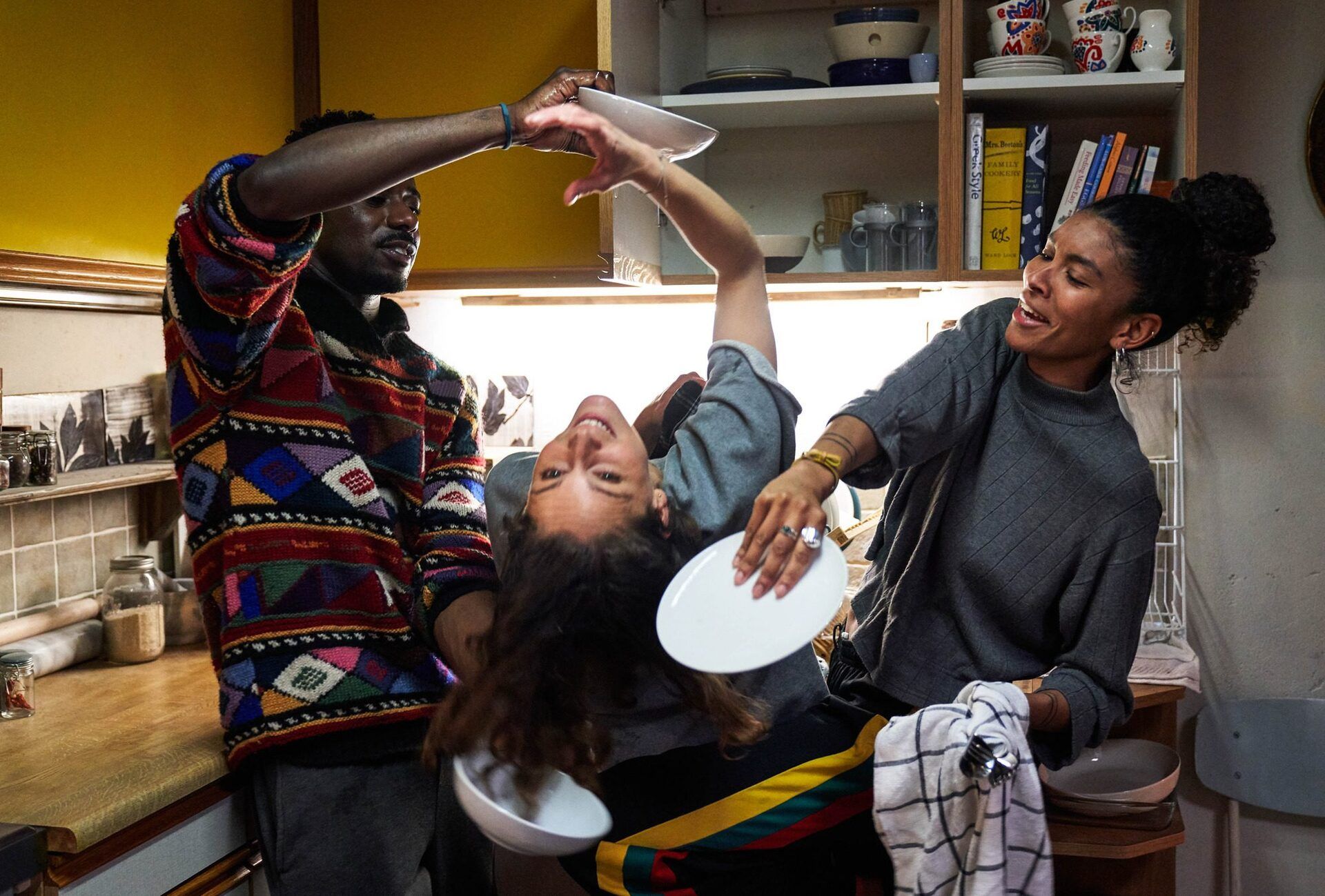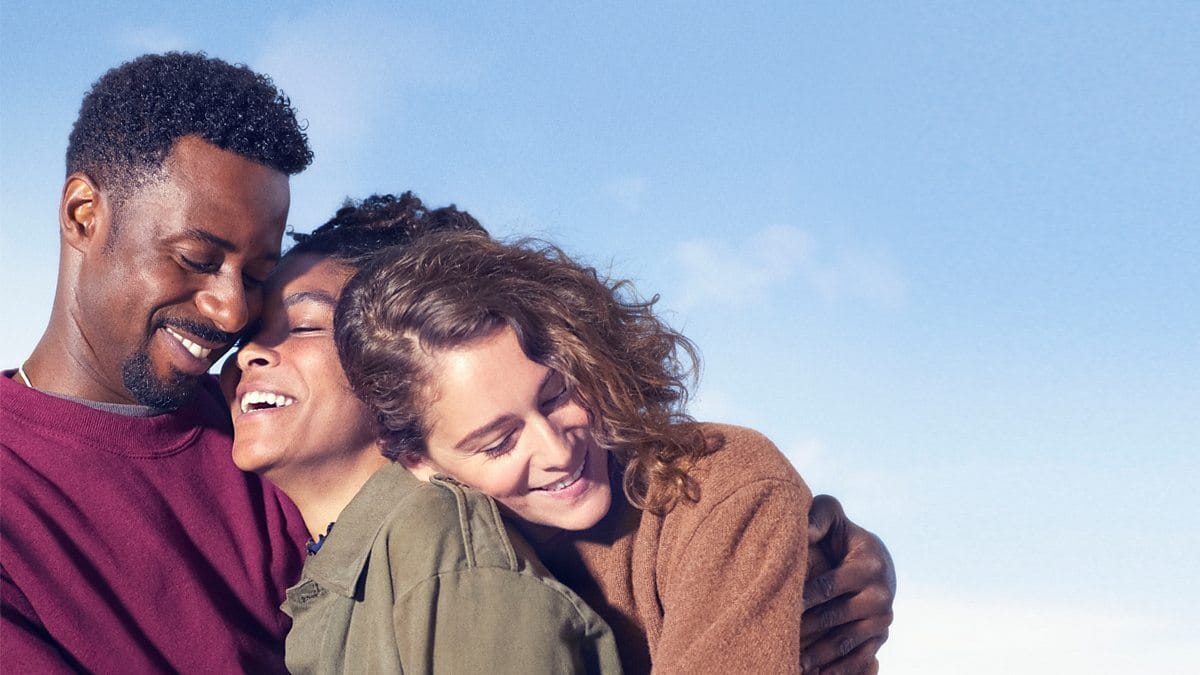Hey there!
You’re reading Cheers to Travels Letters, a slow newsletter about living, loving, and traveling on our own terms. Each edition shares real stories, lessons, and moments from life as digital nomads and a throuple, exploring the world with purpose, connection, and curiosity.
Let’s wander together..
LETTER NO 7
Reflections on Trigonometry
We just finished watching Trigonometry together, and wow, there’s so much we could unpack. I wanted to get this down while the feelings are still fresh, because this time around it really resonated with us - together and separate - in ways that surprised me.
A Quick Recap of the Series
For anyone reading who hasn’t seen it yet, here’s the gist:
Trigonometry is a British eight-part drama that premiered on BBC Two in March 2020.
It centers on a London couple, Gemma and Kieran, who live together, love each other but are under pressure financially and emotionally. They take in a lodger, Ray, to make ends meet. What begins more or less as a practical decision becomes much more, an emotional, romantic and sexual triangle.
Reviews describe it as treating the relationship not as a “wild experiment” but simply as a love story of three people - messy, tender, ordinary in its own ways. For example:
Sexuality and the third partner aren’t fetishised or sensationalised, which is rare.
FROM THE ROAD
We’re still learning that it’s okay to take up space — three seats on a bus, three hands in one frame, three hearts in one story.
If Trigonometry taught us anything, it’s that love doesn’t need to look “normal” to feel right.

Why We Felt It
What struck me is how many little / big moments in the show mirrored our own experience as a throuple, not exactly in plot, but in emotional texture. I’ll run through them below.
Individually
Gemma is juggling her café, Kieran is working nights, time is tight. That sense of fatigue, of life-logistics pressing in on the romantic or the playful - yep, I’ve felt that.
Ray has a career-ending injury as a swimmer; she’s navigating identity, what she wants, where she fits. I’m not Ray, but I recognize that feeling of “what now?” when one part of yourself shifts and the others need to catch up.
There are scenes where one character holds back, doesn’t quite say something, watches instead of acting. That’s pretty much one of us when we’re nervous about what the other two are doing or what they feel.
Coming-out isn’t dramatic fireworks, but there are silences and moments of hesitation. The show does a quietly powerful job of that.
Together and three
Ray moving in sparks something that is different from when they were just Gemma + Kieran. The energy shifts. We’ve felt that. The three of us occasionally feel it: it’s not just adding someone, it’s adding a shape to the relationship.
The “third person sits alone” anxiety came up in the show: for instance, there’s a bus ride where seating becomes symbolic of belonging (or not). I won’t spoil it, but I remember thinking of us quietly when watching their ride.
The sweetness of domestic scenes (making breakfast, shared jokes, Ray in the café) reminded me that polyamory isn’t always fireworks, it’s also potatoes and bills and the fridge needing cleaning.
The sexual chemistry: the way it’s sometimes blundering, sometimes beautiful. The show doesn’t gloss over awkwardness. That level of realism is what we live.
The social awkwardness: when friends ask “so you’re all… together?” and there’s a pause. The show gives that moment space. We’ve had it too.
And maybe most poignantly: the feeling of being normal but also abnormal. Because in the show, they’re just three people who love each other but the world sees them differently. That mirrors us.
The Emotional Undercurrent
What I found myself thinking through while watching:
You know how sometimes we feel like we’re the weird ones? The show leans into that: three people in a relationship that society still doesn’t “get”. But at the same time it pushes back: love is love, messy or not.
I loved that the characters never needed to perform perfection. They made mistakes. They communicated (sometimes poorly) and re-communicated. That’s real.
There’s tension around visibility: telling family/friends, figuring out how to “explain” the relationship. That’s heavy. We’ve done that. We’re still doing it.
I felt what they feel when the outside world watches or asks: Do you all have to sit together? Who is with whom when? The show touches that, subtle but persistent.
There’s the envelope of safety: emotional safety, sexual safety, relational safety. The show suggests that it’s harder for three than for two, but not impossible.
Most of all: the idea that being “normal” doesn’t mean being “like everyone else”. Yes, in our throuple, we do the laundry, we watch Netflix, we fight over food take-out choices, we worry about money. That’s normal. And somehow we feel abnormal anyway. That dichotomy hit me watching it.
Some Complications We Witnessed -Together
We should be real: the show also brought up some of the trickier territory we’ve navigated or will navigate. Because love is not always sugar-coated, especially when you’re three.
Jealousy and fear: Kieran sees Gemma looking at Ray; Ray sees Kieran looking at Gemma. Each has to negotiate what that means. We’ve had those glances too.
Boundaries: What counts as “alone time”? What is the “we” time vs “you and me” time vs “you and them”? The show plays with that.
Public perception: One scene where the couple walk together, Ray behind, someone asks “is she your friend?” The third seat, the third person, small moments like that ripple.
Coming out to family/friends: Ray’s mum, Gemma’s family -reactions are mixed. We’ve been brave, but behind the scenes we carry anticipatory fear.
Sex life: The show doesn’t shy away from sex, but doesn’t fetishize it either. It’s sometimes clumsy, sometimes joyful, sometimes quiet. That ringed true for us.
Future thinking: The last episode has a pregnancy and so many questions of what tomorrow looks like. Us? We try to think ahead, but we also stay in now.
The road is tough, yes, but it’s also full of ordinary moments that feel extraordinary simply because they’re done differently.
We feel love, we feel domesticity, we feel awkwardness, we feel joy. Because representation like Trigonometry reminds us: our shape might be different, but the core is still love and connection.
~Cheers To Travels
TRAVEL GEMS
Our Favorite Finds
▶ Favorite Unexpected Travel Companion: Georgie or “G”, our travel friend’s dog
▶ Must-Have Wellness Item While Traveling: Vitamins & Supplements
▶ Little Indulgence: Acai in Brazil
▶ Random Act of Kindness We Experienced: A friend gifted us 3 flowers for the wedding anniversary of the married couple

